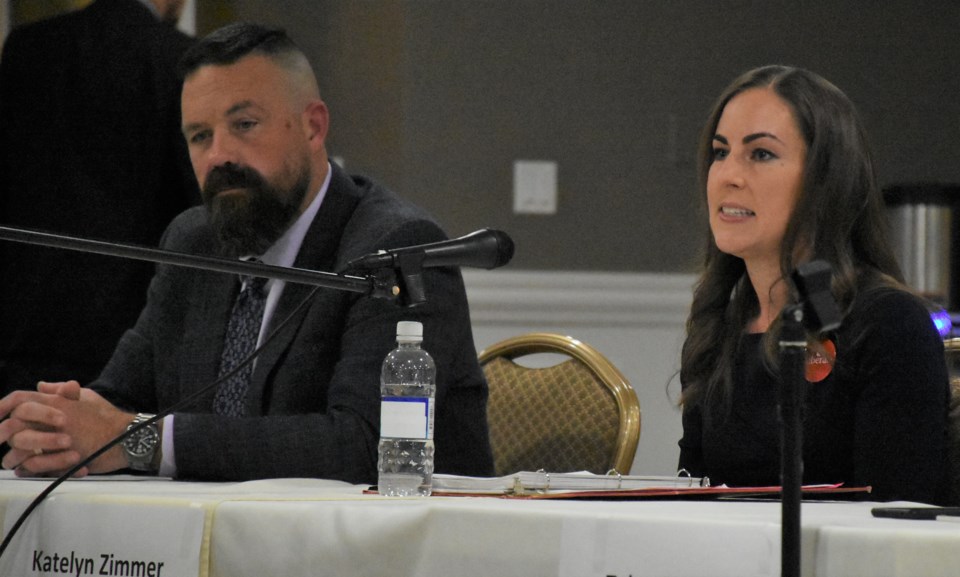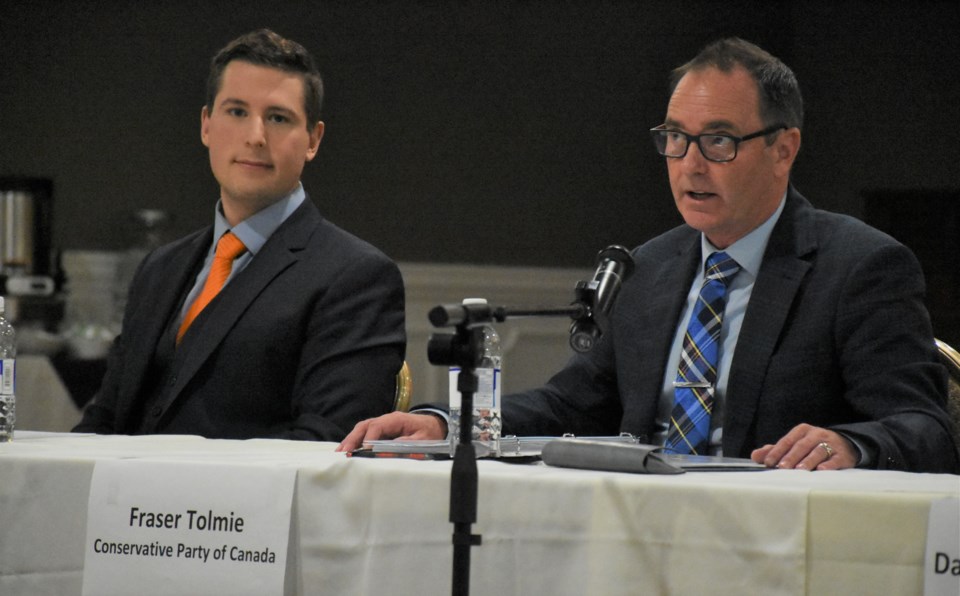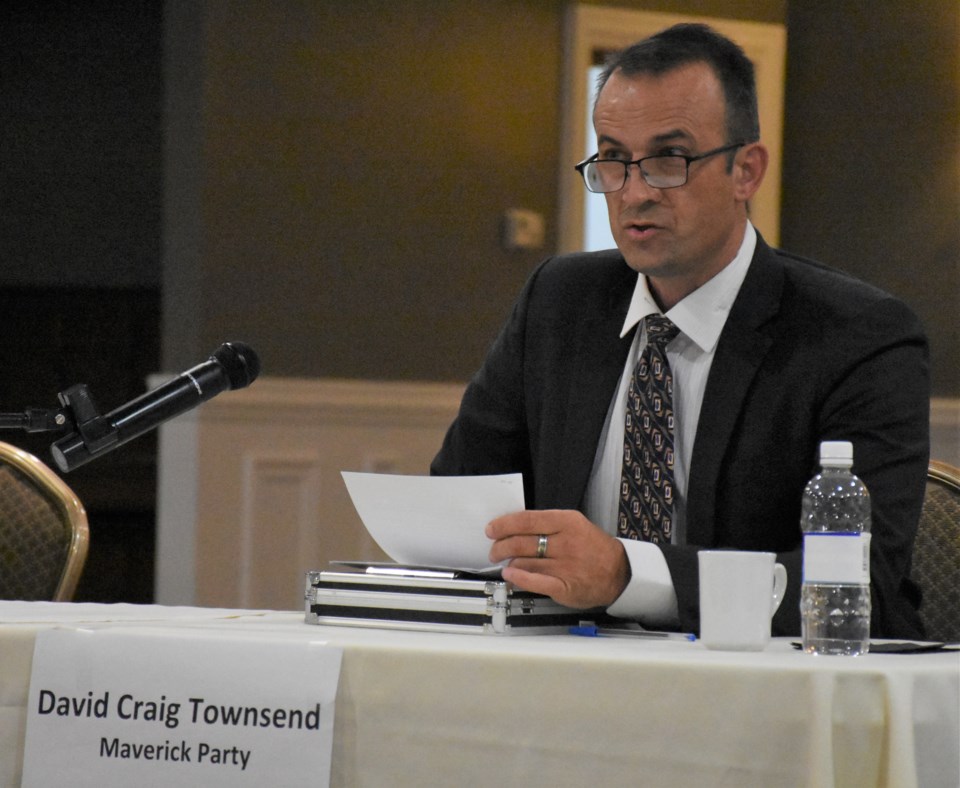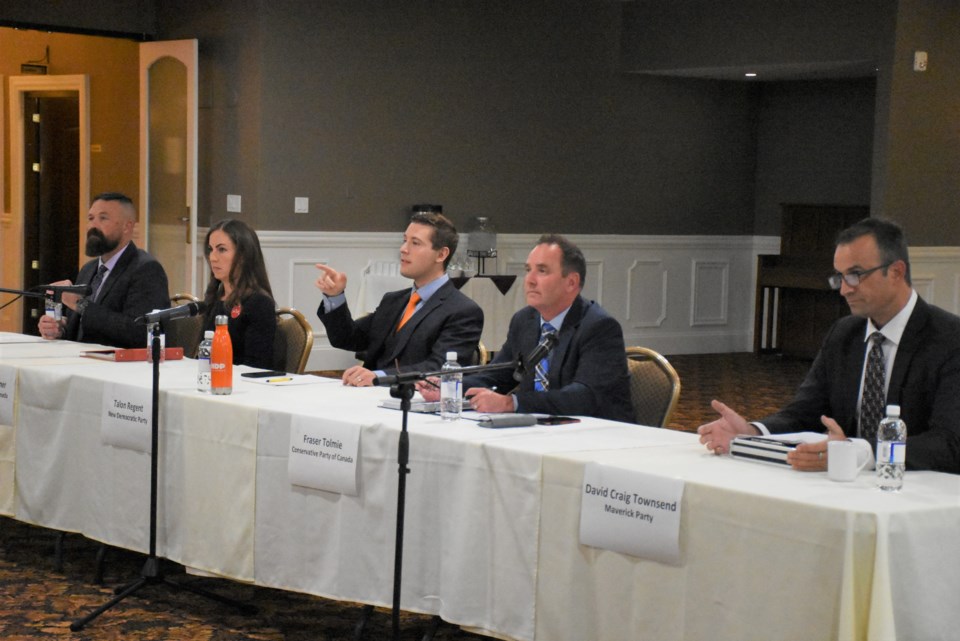Addressing gun control and figuring out how to handle climate change without damaging the economy were some topics discussed during a recent election forum in Moose Jaw.
The Moose Jaw & District Chamber of Commerce held an all-candidates forum at Grant Hall on Sept. 14. Five of six candidates running in the Moose Jaw-Lake Centre-Lanigan constituency discussed their parties’ plans for Canada’s future.
Chey Craik with the People’s Party of Canada (PPC), Katelyn Zimmer with the Liberal Party of Canada (LPC), Talon Regent with the New Democratic Party (NDP), Fraser Tolmie with the Conservative Party of Canada (CPC) and D. Craig Townsend with the Maverick Party (MP) spoke during the two-hour event, which featured five pre-determined questions — many about the economy and small business — that candidates received ahead of time and four questions submitted online.
Isaiah Hunter with the Green Party of Canada was absent.
The federal election is Monday, Sept. 20.
Gun control policy
As a “gun guy,” Craik said the PPC would cancel Bill C-71 — Ottawa’s firearms legislation that outlaws 1,500 “assault-style” rifles — and focus on criminals. This would include strengthening current laws and better supporting police forces.
There are more than two million licensed gun owners in Canada who are vetted and tested, he added. Craik believes these people are not the problem; the federal government and criminals are the issue.
Zimmer is trained as a veterinarian to use firearms — if necessary — on large animals. She also married into a family that hunts, which was hard for her to accept since she comes from a family that saves animals.
Assault-style firearms are unnecessary to lead a normal life in Saskatchewan, while high-capacity magazines are also not needed, she said. Therefore, the LPC would ban these two items.

As a provincial silver medallist target shooter, Regent is also licensed to use guns. He noted that the NDP would take a “measured and targeted approach” by reviewing the science and listening to experts on this issue.
“What the experts tell us is that illegal firearms are coming across the American border,” he said. “We need to ensure the Canadian Border Services Agency has the appropriate level of funding and resources to stop those guns from coming across the border.”
The NDP would also take a regional approach to gun control, considering gun crime happens more in Toronto and Vancouver than Moose Jaw, Regent added. These measures would ensure gun control measures are not “overly restrictive.”
Tolmie criticized the Liberals for demonizing law-abiding gun owners, pointing out that the Coalition for Firearms Rights has said Liberal leader Justin Trudeau is using this concern as a divisive wedge issue instead of making it about public safety.
Classification of guns should not be a political issue, while the CPC welcomed the chance to depoliticize the topic and focus on safety, Tolmie added.

The Maverick Party is opposed to the federal government’s firearms buyback program and supports the appointment of a chief firearms officer based in Western Canada, along with an independent process to review all firearms legislation, said Townsend. The party also believes that western provinces should have greater autonomy and oversight of gun laws.
Climate change, energy, agriculture
The chamber asked candidates whether they thought climate change was a threat to the economy and how their parties would balance addressing climate change while not harming the energy and agriculture sectors.
Tolmie noted the University of Regina produced a research paper that showed Saskatchewan has faced 44 droughts between 1910 and 2009, which means droughts are nothing new here. However, the way this issue is handled continues to evolve, which is why the CPC will invest in the Lake Diefenbaker irrigation project.
“Climate change makes drought season more frequent, which makes this project more important to safeguard the livelihoods of farmers,” he said, adding Saskatchewan developed a plan to ensure farmers wouldn’t be saddled with a hefty carbon tax bill.
Ottawa’s policies are a threat to Western Canada and not necessarily climate change itself, said Townsend. For example, it makes no sense to destroy Canada’s steel-making ability and import material from China since the emissions move elsewhere.
“Climate is global, so all we would do is punish Canadian workers for a shell game,” he said, adding the Maverick Party would let provinces set their own climate policies.

The hysteria with this issue is the main threat since major hardship is already being imposed on the agriculture community, said Craik. That’s why the PPC would end the “climate tax craziness,” since he says no amount of taxpayers’ money will change the atmosphere and Canada’s impact on global emissions is insignificant at 1.6 per cent.
The PPC would also remove Canada from the Paris climate accord and focus on halting the pumping of billions of litres of raw sewage into Canadian waterways, he added.
Climate change threatens the economy, as shown by wildfires in British Columbia and droughts and crop failure in Saskatchewan, said Zimmer.
She noted that the Conservatives have held this constituency since its inception, which has only produced more political polarization. That is why the Liberals believe electing an Liberal MP from Saskatchewan would give this province a seat at the decision-making table.
Canada is in a climate emergency and this crisis needs to be overcome, said Regent. He remarked that the Conservatives allegedly don’t recognize climate change while the Liberals talk a good game but give exemption to big polluters. The NDP, however, would invest funds to address this problem.
“If we don’t invest now, that (climate problems) is all going to get worse and it will be more expensive (to address) down the road,” he continued, adding Canada is well-placed to grow the renewable energy sector, including wind, solar, and geothermal.




